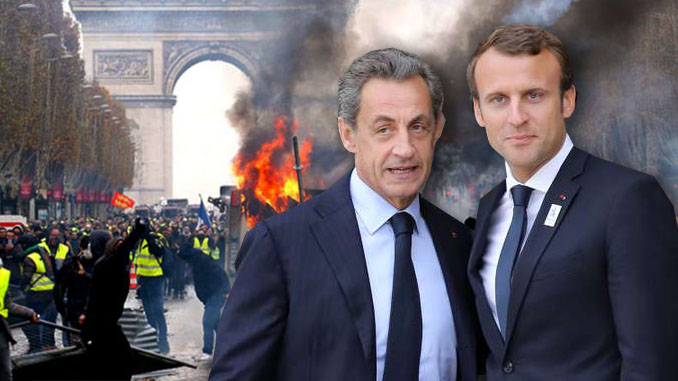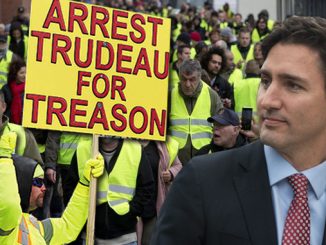
Average Frenchmen say they can’t make ends meet under the existing system and have flooded the streets in Yellow Vests, and the country’s leftist president has turned to a conservative for advice.
By S.T. Patrick
With Paris flooded by protestors, tension, and turmoil, President Emmanuel Macron has turned to an unlikely source for counsel. Within the last three weeks, the leftist Macron has sought input from former conservative French President Nicolas Sarkozy.
Sarkozy was in office from 2007 to 2012, before being defeated by Socialist Party candidate François Hollande by a narrow margin. Sarkozy guided France through the global recession of 2008 and the Arab Spring of 2010. A former minister of the budget and minister of finances, Sarkozy, a hardliner on law and order, is well-equipped to aid Macron in navigating through the protests that have taken over Parisian streets.
“Yellow vest” protestors have demonstrated in some of the most posh districts of Paris in recent weeks. The yellow vests have called for the resignation of Macron as president, as well as lower fuel prices, a higher minimum wage, and a lower national tax burden on the middle and poorer classes.
Quite unlike the American Republicans, the French right is now steeped heavily in populism. In the U.S., the GOP has convinced its middle-class voters to back policies that place the desires of billionaires over an improved cost of living, for example. The French right, however, represents the majority of the yellow vests, named after the 2008 law that required French motorists to carry a yellow vest in their vehicles. Their chief concern is a worsening daily condition for those who work full-time.
The French right wing still stings from the loss of their candidate, Marine Le Pen of the National Rally Party. At 39, Macron became the youngest French president in history. The middle class and those on the right who had voted for Mrs. Le Pen, however, did not lose their passion for the issues because the results of an election were announced. Many of them have taken to the streets and have refused to allow the status quo to continue to rule France.
There have already been concessions by the Macron government. An agreement was made that the new gas tax would be cancelled and a six-month moratorium on gas price changes would be installed, the minimum wage will be raised significantly by 2019, and the tax on overtime hours and annual bonuses would be eliminated.
There are historical problems with Macron, of which the yellow vests are fully aware. He has always had his mind on government. He graduated with a masters of public affairs and studied at a college founded for French civil servants. More importantly, he was a banker. But he was not just any investment banker. Macron honed his trade under the watchful eye of the Rothschild family at Rothschild & Cie Banque. His policies have enriched those who control the industries that receive financing from those banks. If the French elite win, Rothschild & Cie wins. The French have shown that they are wise enough to fight these policies en masse.
Sarkozy can also be an ally at the bargaining table. He was once called upon to mediate between Russia and Georgia in 2008. Whether Macron, currently hovering around a 20% approval rating, can ameliorate the concerns of the angst-ridden voters in the new year is anyone’s guess. Can he convince those hurting and struggling to make short-term sacrifices in an effort to achieve long-term growth?
Americans could learn something from the yellow vests. It is easy to sit in front of the big screen television and scoff at those protesting around the world. There was once a time in America where citizens also took to the streets to protest taxes, mercantilism, tariffs, and tea.
Yet the yellow vest movement is spreading. Yellow vest marches have sprung up throughout Europe and beyond. From Italy to Serbia, from Egypt to Canada, safety vest-clad protestors are marching in an attempt to bring attention to rising energy prices, lower comparable wages, and economic uncertainty.
The French workweek is 40% shorter than it was in the 1950s—and it isn’t because the workers want to sip champagne along the shores of the Seine. The tax structure in France has become so burdensome that it has depressed the drive to work. Atlas has shrugged in Paris, and the take line is now more attractive and profitable than the line of givers.
S.T. Patrick holds degrees in both journalism and social studies education. He spent 10 years as an educator and now hosts the “Midnight Writer News Show.” His email is [email protected].


